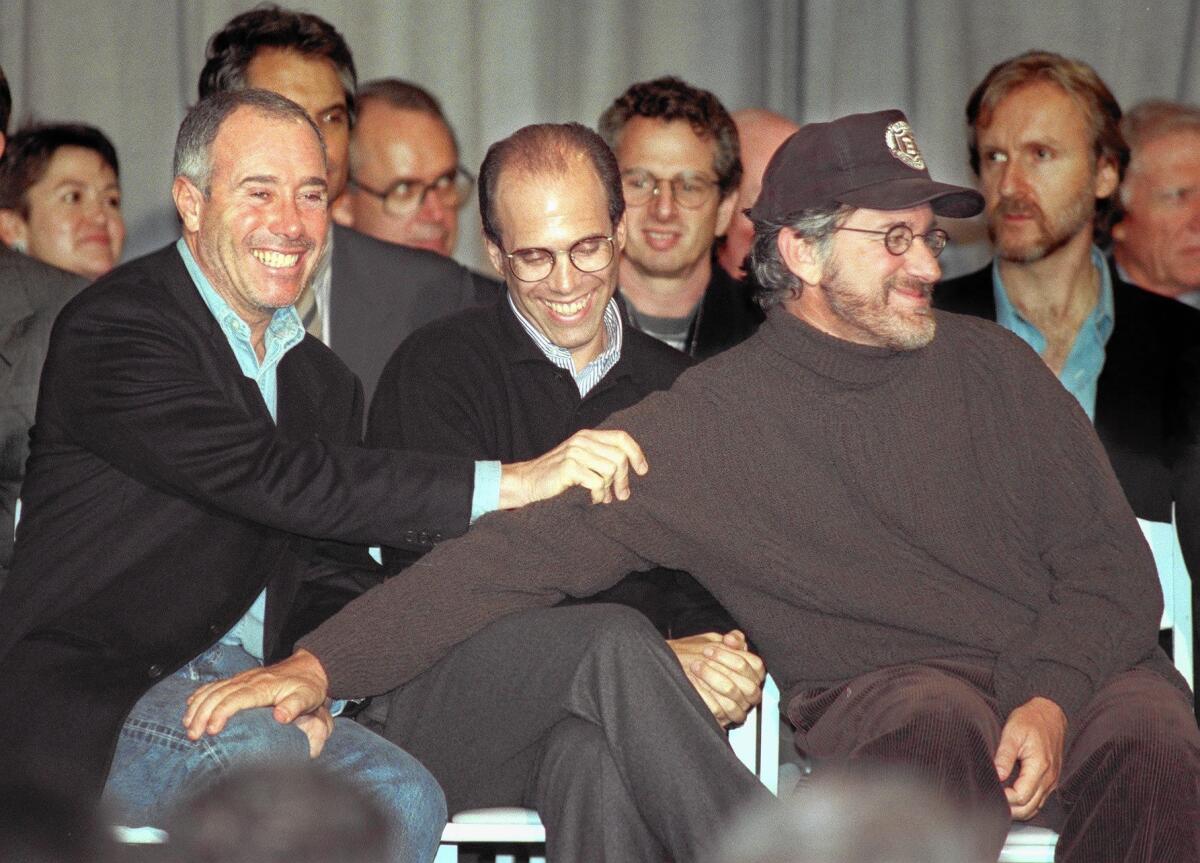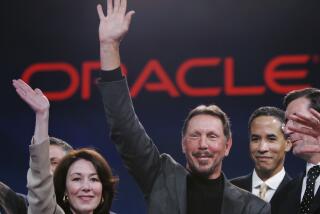A $400-million payday awaits DreamWorks Animation founder Katzenberg

- Share via
Being forced out of Walt Disney Co. two decades ago may have been the best thing to happen to Jeffrey Katzenberg.
It didn’t seem so at the time. But if that had never happened, he wouldn’t have started DreamWorks Animation — or be in line for a nearly $400-million payoff he will get with its sale to Comcast’s NBCUniversal.
In addition to rewarding the 65-year-old mogul handsomely, the $3.8-billion deal could provide a secure future for the studio he led for the last 22 years.
“He goes out with a swan song,” said Michael Helfant, a movie producer and former Marvel Studios executive. “From his standpoint, it looks like a great move. He’s got a great price, and he’s going to have a great payday. I think it sounds like a great strategy for him.”
Katzenberg was initially conflicted about the prospect of turning over the studio with which he has been so closely identified to someone else, said one person familiar with the deal who was not authorized to comment publicly.
But he recognized that he had little alternative, given Comcast’s rich proposal — the company offered a 50% premium over DreamWorks Animation’s closing stock price Tuesday — and the challenges it faced as a stand-alone studio in an increasingly crowded animation market.
After a string of box-office misfires, DreamWorks Animation last year was forced to cut about 20% of its staff. That was a blow to Katzenberg, who had long prided himself on avoiding layoffs and creating a workplace environment more akin to Silicon Valley than Hollywood.
After the deal closes, Katzenberg will hand oversight of his company to Chris Meledandri, the head of Universal’s animation division Illumination Entertainment. Katzenberg will become chairman of the newly formed DreamWorks New Media, made up of the firm’s stakes in the YouTube teen network AwesomenessTV and the technology company Nova. Katzenberg also will serve as a consultant to NBCUniversal.
Katzenberg, who has long been known for his tightfisted management style, was true to form at the negotiating table with Comcast, analysts said. Extracting a $41-a-share purchase price from the cable company could be Katzenberg’s crowning achievement, given DreamWorks Animation’s uneven performance in recent years.
“He certainly has achieved a much fuller valuation than anyone would’ve thought,” said Matthew Harrigan, a media analyst with Wunderlich Securities.
Katzenberg stands to reap a substantial financial reward for nailing down the deal. If the sale closes, the mogul’s ownership stake in DreamWorks Animation would be worth about $396 million, according to research firm Equilar Inc.
If Katzenberg were to leave the company in the event of a sale, he would be entitled to an additional payout of nearly $22 million, according to a regulatory filing, based on DreamWorks Animation’s stock price at the end of 2015. It’s not clear whether Katzenberg will receive that severance, given that he will still be in charge of some of the company’s digital media initiatives.
Katzenberg’s net worth reportedly stands at more than $1 billion, putting him in rarefied air among Hollywood’s elite. But he’s not nearly the richest of film executives who have sold out.
“Star Wars” creator George Lucas is worth $5 billion, according to Forbes, having sold his production company Lucasfilm to Disney in 2012. Marvel Entertainment Chief Executive Isaac Perlmutter, who sold his company to Disney in 2009, is worth about $3.9 billion.
What happens next for Katzenberg is not clear. Although he’ll head DreamWorks New Media, some observers wonder if that’s all he has planned. It’s yet to be seen whether the new division he will head will remain part of NBCUniversal or be spun off, according to a person familiar with the matter who was not authorized to speak publicly.
“He’s such a larger-than-life personality, so it’s hard to imagine that this is going to be his main job,” Harrigan said.
A bold turn isn’t out of the question for Katzenberg, who is a prominent Democratic fundraiser with deep political ties. “Maybe he’ll run for governor of California,” Harrigan said.
Katzenberg declined to comment, but in an address to his staff members Thursday he sought to assure them about their future.
“There is no doubt that the best days for DreamWorks lie ahead,” he said. “Our brand could not be in better hands.”
If Katzenberg’s past career moves are any indication, a splashy next act could follow.
Just a month after leaving his post as head of Walt Disney Studios in September 1994, Katzenberg founded the live-action and animation studio DreamWorks with partners Steven Spielberg and David Geffen. The launch of the audacious new company, which even included the executives’ initials in its official name — DreamWorks SKG — drew equal measures of plaudits and scoffs for its ambitious plans. It also came as Katzenberg, upset at being passed over for Disney’s No. 2 job, was gearing up for a years-long legal battle with the company and its pugnacious leader, Michael D. Eisner.
The bitter, $250-million breach-of-contract case enraptured Hollywood with its airing of humiliating dirty laundry, including an infamous admission by Eisner that he may have once said of Katzenberg, “I hate the little midget.” Katzenberg won the case — netting a confidential settlement that analysts at the time said could be worth as much as $275 million — but it was not without a price. The embarrassing matter cast a pall over his post-Disney efforts with DreamWorks SKG.
Besides making movies, DreamWorks SKG launched an interactive studio that developed “Jurassic Park”-themed video games, started a record label that released splashy albums like George Michael’s “Older,” and announced plans for a 1,000-acre studio facility in Playa Vista that would’ve included 18 soundstages and a lake. But the company foundered, the backlot was never built, and DreamWorks SKG splintered — partly under the weight of its ambitions. It ultimately was absorbed in diminished form by Paramount Pictures in 2005.
After DreamWorks Animation was spun off in 2004, the studio under Katzenberg became a force, churning out a string of hits such as “Shrek,” “Kung Fu Panda” and “Madagascar.” In recent years, however, DreamWorks Animation struggled to repeat the success of its earlier films as it faced mounting competition from rival studios, including Disney and Fox.
By 2014, Katzenberg was trying to unload the company but was humbled when talks collapsed with two potential suitors: toy maker Hasbro and Japanese telecom firm SoftBank.
Now he’s finally been rewarded for his effort in the trenches. In Hollywood, where every agent, producer and would-be mogul keeps a score card of winners and losers, Katzenberg is getting — besides the money — something that observers say matters a great deal to him.
“He walks away with a lot of money and he walks away feeling like a winner, which I think was more important for him,” said Doug Creutz, a media analyst at Cowen & Co. “He’s been shopping this around for years, and he finally found someone who was hip to buy.”
ALSO
Comcast’s NBCUniversal buys DreamWorks Animation in $3.8-billion deal
Viacom’s Paramount Pictures suffers $136-million operating loss
Chris Meledandri of Illumination Entertainment to oversee DreamWorks Animation
More to Read
From the Oscars to the Emmys.
Get the Envelope newsletter for exclusive awards season coverage, behind-the-scenes stories from the Envelope podcast and columnist Glenn Whipp’s must-read analysis.
You may occasionally receive promotional content from the Los Angeles Times.












